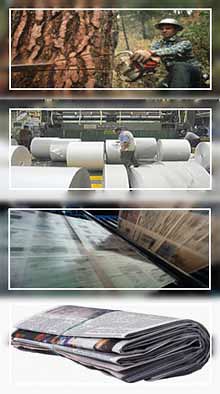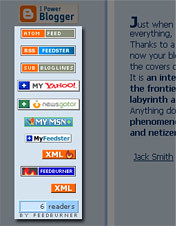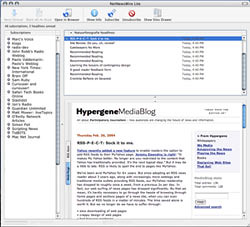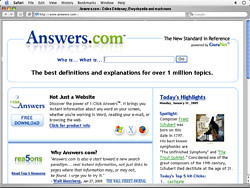| |
|
 |
| |
درباره روزنامه نگاري و اينترنت Why cyber journalism vs print journalism?Newspapers are in trouble. Readers are straying in papers. This blog will explore where we've gone wrong and what we're doing right, with an eye toward REWRITING THE FUTURE OF JOURNALISM. |
|
 |
|
 |

|
| |
|
 |
| |
Saturday, December 31, 2005
Saturday, November 26, 2005
Top 100 Daily Newspapers 2005
Wednesday, November 16, 2005
Time Flying By, Not In Seconds but Clicks
Thinking Digitally
Saturday, October 22, 2005
Wikipedia, A Reliable Source?
Tuesday, October 18, 2005
One Blog Created 'Every Second'
Tuesday, October 11, 2005
Monday, September 12, 2005
Guardian: Sie ist ein Berliner!
AP News Coverage of the War in Iraq
Dead Trees: RIP for Newspapers?!
Big Media Companies Weigh Blog Strategies
Poynter, Knight Launch Online Training Portal
"Spring" Is Knocking at Our Door
The Growing Popularity of RSS
Survey Indicates 75.3% Read Blogs for "News I Can't Find Elsewhere"
Using RSS to Follow Your Beat
Wednesday, March 09, 2005
RSS can smooth out waves for information surfing
Saturday, February 12, 2005
Sunday, February 06, 2005
Pushing Boundaries, Blending Borders
A New Search Paradigm: Real Instant Information vs Links To Pages
Thursday, January 27, 2005
Keyboard-to-Keyboard Combat!
Tuesday, January 25, 2005
Web logs come of age as source of news
Not the Container but the Content
Saturday, January 22, 2005
Bloggers Move Into the Mainstream
Wednesday, January 19, 2005
Dialogue of Journalists and Bloggers at Harvard
|
|
 |
|
 | |
|
































